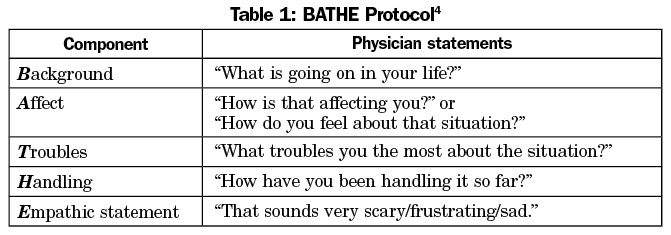What We're Reading Now
Listen Better Faster
17 October 2017
Allison read Inpatient Satisfaction Improved by Five-Minute Intervention, Study Finds in the UVA Today Daily Report and reflected on how the BATHE technique could help everyone to listen better faster.
Tags: allison read, empathy, healthcare, listening, uva
I believe listening is the single most important thing you can do to improve your relationships. I always begin our Effective Communication Skills course by reviewing active listening techniques and then having participants practice with a partner.
No one has ever said to me, “Allison, I disagree. I don’t think listening matters at all.” But a lot of people have said, “I get it. Listening is important, but I’m exhausted and don’t know how to make the time.”
This concern that many of us have about the time needed to be a good listener is understandable. That’s why I was especially encouraged to learn that “a study at the University of Virginia School of Medicine recently found that a daily five-minute conversation that focused on hospitalized patients ‘as people’ significantly improved their satisfaction with their medical care.”
After reading about how “UVA associate professor and clinical psychologist Claudia Allen regularly teaches a brief psychosocial intervention called BATHE (which stands for 'background, affect, trouble, handling and empathy') to family medicine doctors in training,” I wondered if this technique could work for non-physicians. I I found these questions that expand the meaning of each word in the acronym, BATHE, in a longer article on the Society of Teachers of Family Medicine site by the UVA research team.

*see below for Table 1 source
While you could make the argument that the parameters of a physician to patient encounter are set up for these questions to flow more naturally, I think those of us in nonclinical settings could use these open-ended questions to be better, more empathetic, and even faster listeners in our everyday lives. The study revealed that “improvement in patient satisfaction didn’t occur because BATHE patients had lengthier visits with their doctors… rather, the improvement in satisfaction was associated with the BATHE patients’ perceptions that their physician ‘showed a genuine interest in me as a person.’”

*Table 1: BATHE Protocol taken from Effects of a Brief Psychosocial Intervention on Inpatient Satisfaction: A Randomized Controlled Trial by Emma J. Pace, MD; Nicholas J. Somerville, MD, MPH; Chineme Enyioha, MD; Joseph P. Allen, PhD; Latrina C. Lemon, MD; Claudia W. Allen, PhD, JD which sites Stuart M, Lieberman J, Seymour, J. The Fifteen Minute Hour: Therapeutic Talk in Primary Care, 4th ed. London: Radcliffe Publishing; 2008.







Comments
Our Comment Policy:
Our blog posts are only half of the conversation. What our readers have to say is equally important to us, and we're grateful for all the comments that continue the dialog.
To ensure that the discussion here is as useful as possible to all of our readers, please be respectful of our contributors and refrain from harassing, threatening and/or vulgar language. We reserve the right to screen and remove any comments from the site. If you have a question about a comment or want to discuss our policy, please contact us. We'll talk it over.
There are no comments for this entry yet.